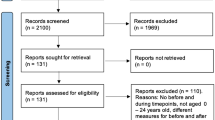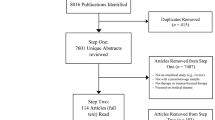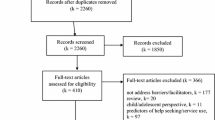Abstract
Objective
To determine whether paediatric intensive care unit (PICU) admission is associated with greater psychiatric morbidity in children and parents as compared with general paediatric ward admissions.
Design
Retrospective cohort study.
Setting
Paediatric intensive care unit and two general paediatric wards of a London teaching hospital.
Participants
Children aged 5–18 years discharged from PICU (exposed cohort) and general paediatric wards (unexposed cohort) 6–12 months previously, together with their parents.
Measurements and results
Children: the Clinician Administered Post Traumatic Stress Disorder (PTSD) Scale for Children (CAPS-C), the Impact of Event Scale (IES), Strengths and Difficulties Questionnaire, Birleson Depression Scale, Revised Children’s Manifest Anxiety Scale, Child Somatization Inventory. Parents: IES, General Health Questionnaire, Beck Depression Inventory, Hospital Anxiety and Depression Scale. Thirty-five of 46 (76%) PICU-discharged families and 33 of 41 (80%) from general paediatric wards participated. Valid CAPS-C data were obtained for 19 PICU-admitted children and 27 children admitted only to the general paediatric ward; 4/19 (21%) of PICU-discharged children developed PTSD (compared with none of 27 ward admissions), p=0.02. PICU children had significantly more PTSD features of irritability and persistent avoidance of reminders of the admission. Parents of PICU children were more likely to screen positive for PTSD (9/33 (27%) compared with 2/29 (7%) parents of ward-admitted children), p=0.04. There were no significant differences between the groups for other measures of psychopathology.
Conclusion
Post traumatic stress disorder diagnosis and symptomatology is significantly more common in families where a child has been admitted to the PICU. Consideration should be given to providing psychological support for children and parents after PICU admission.
Similar content being viewed by others
References
Stuber ML, Meeske K, Gonzales S, Houskamp BM, Pynoos R (1994) Post-traumatic stress after childhood cancer 1. The role of appraisal. Psycho-Oncology 3:305–312
Butler RW, Rizzi LP, Handwerger BA (1996) Brief report: the assessment of posttraumatic stress disorder in paediatric cancer patients and survivors. J Pediatr Psychol 21:499–504
Shalev A, Schreiber S, Galai T, Melmed RN (1993) Post-traumatic stress disorder following medical events. Br J Clin Psychol 32:247–253
Landolt MA, Boehler U, Schwager C, Schallberger U, Nuessli R (1998) Post-traumatic stress disorder in paediatric patients and their parents: an exploratory study. J Paediatr Child Health 34:539–543
Gledhill J, Garralda ME (2000) The relationship between physical and mental health in children and adolescents. In: Gelder MG, Lopez-Ibor JJ, Andreasen NC Andreasen (eds) New Oxford textbook of psychiatry. Oxford University Press, Oxford, pp 1834–1843
Walker AM, Harris G, Baker A, Kelly D, Houghton J (1999) Post-traumatic stress responses following liver transplantation in older children. J Child Psychol Psychiatry 40 (3):363–374
Lloyd GG (1993) Psychological problems and the intensive care unit. BMJ 307:458–459
Jones SM, Fiser DH, Livingston RL (1992) Behavioural changes in paediatric intensive care units. Am J Dis Child 146:375–379
Gemke RJBJ, Bonsel GJ, Van Vught AJ (1995) Long term survival and state of health after paediatric intensive care. Arch Dis Child 73:196–201
Judge D, Nadel S, Vergnaud S, Garralda ME (2002) Psychiatric adjustment following meningococcal disease treated on a PICU. Intensive Care Med 28:648–650
Nader KO, Kriegler JA, Blake DD, Pynoos RS (1994) Clinician administered PTSD scale for children (CAPS-C). National Centre for PTSD, Boston, MA
American Psychiatric Association (1994) Diagnostic and statistical manual of mental disorders, 4th edn (DSM-IV). American Psychiatric Association, Washington DC
Horowitz M, Wilner N, Alvarez W (1979) Impact of Event Scale: a measure of subjective stress. Psychosom Med 41:209–218
Yule W, Udwin O (1991) Screening child survivors for post-traumatic stress disorders: Experiences from the “Jupiter” sinking. Br J Clin Psychol 30:131–138
Perrin S, Smith P, Yule W (2000) Practitioner review: the assessment and treatment of post-traumatic stress disorder in children and adolescents. J Child Psychol Psychiatry 41(3):277–289
Goodman R (1997) The Strengths and Difficulties Questionnaire: a research note. J Child Psychol Psychiatry 38:581–585
Birleson P (1981) The validity of depressive disorder in childhood and the development of a self-rating scale: a research report. J Child Psychol Psychiatry 22:73–88
Reynolds CR, Richmond BO (1978) What I think and feel: a revised measure of children’s manifest anxiety. J Abnorm Child Psychol 6:271–280
Garber J, Walker L, Zeman J (1991) Somatization symptoms in a community sample of children and adolescents: further validation of the Children’s Somatization Inventory. J Consult Clin Psychol 3:588–595
Neal LA, Busuttil W, Rollins J, Herepath R, Strike P, Turnbull G (1994) Convergent validity of measures of post-traumatic stress disorder in a mixed military and civilian population. J Trauma Stress 7(3):447–455
Goldberg D (1972) The detection of psychiatric illness by questionnaire. Oxford University Press, Oxford
Beck AT, Ward CH, Mendelson M, Mock J, Erbaugh J (1961) An inventory for measuring depression. Arch Gen Psychiatry 4:561–569
Zigmond AS, Snaith RP (1983) The Hospital Anxiety and Depression Scale. Acta Psychiatr Scand 67:361–370
Stallard P, Velleman R, Baldwin S (1998) Prospective study of post-traumatic stress disorder in children involved in road traffic accidents. BMJ 317:1619–1623
Keppel-Benson J, Ollendick T, Benson M (2002) Post-traumatic stress in children following motor vehicle accidents. J Child Psychol Psychiatry 43(2):203–212
Playfor S, Thomas D, Choonara I (2000) Recollection of children following intensive care. Arch Dis Child 83(5):445–448
Rundshagen I, Schnabel K, Wegner C, Schulte am Esch J (2002) Incidence of recall, nightmares and hallucinations during analgosedation in intensive care. Intensive Care Med 28:38–43
Malmquist C (1986) Children who witness parental murder: posttraumatic aspects. J Am Acad Child Psychiatry 25(3):320–325
Shears D, Garralda ME, Nadel S, Gledhill J (2002) Psychological outcome of children admitted to hospital with meningococcal disease. Arch Dis Child 86 (suppl 1):A26
Perry S, Difede J, Musngi M, Frances AJ, Jacobsberg L (1992) Predictors of post traumatic stress disorder after burn injury. Am J Psychiatry 149:931–935
Bent KN, Keeling A, Rouston J (1996) Home from the PICU: are parents ready? Am J Matern Child Nurs 21(2):80–84
Acknowledgements
We would like to thank all the families who took part in this study.
With many thanks to COSMIC (Children of St Mary’s Intensive Care) for financial support.
Dr. Julia Gledhill is currently supported by a research training fellowship from the Wellcome Trust.
Author information
Authors and Affiliations
Corresponding author
Rights and permissions
About this article
Cite this article
Rees, G., Gledhill, J., Garralda, M.E. et al. Psychiatric outcome following paediatric intensive care unit (PICU) admission: a cohort study. Intensive Care Med 30, 1607–1614 (2004). https://doi.org/10.1007/s00134-004-2310-9
Received:
Accepted:
Published:
Issue Date:
DOI: https://doi.org/10.1007/s00134-004-2310-9




